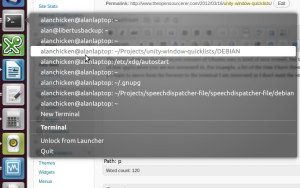Open Standards Open Opportunities
Flexibility and efficiency are perhaps not two words that have been traditionally associated with the public sector in general, and certainly not with government IT. This might change though, and you can help nudge it in the right direction. Last week, just before the budget was announced in front of a packed house of commons there was this little exchange:
John Pugh (Southport, Liberal Democrat)
To ask the Minister for the Cabinet Office what recent assessment he has made of Government policy on open source software and open standards; and if he will make a statement.
Francis Maude (Minister for the Cabinet Office; Horsham, Conservative)
We have always made clear that, where appropriate, Government will procure open source solutions.
Open source products are used in the delivery, of huge database programmes—such as the Indian Identity card scheme—at a greater scale and for much less cost than we have experienced in the past.
Gov.uk, the new platform for publishing in UK Government employs the same open source technologies.
It’s being delivered for a fraction of the cost of previous Government web schemes.
So not a big long speech, but there it is, said in the house and recorded for posterity with the transcript of the oral answers in Hansard and theyworkforyou.com,
The government is moving on Free Software, there is a very high level understanding of the need to avoid lock in, promote re-use and to remove the barriers to adoption for Open Source software. They have been taken for a ride by a bunch of proprietary suppliers who have sold them the same old stuff over and over again, with contracts that tie the government down and keep the gravy train rolling. There is no massive appetite for the government to contribute directly to free software projects, but they are very willing to have more open software from their existing and new suppliers, and to have those suppliers be good citizens in the open source community.
There appears to be a general alignment (and indeed confusion between) open source and open standards. What the government really appears to want is open standards, with open source software as a means to get to an environment where open standards are prevalent. This will give them the re-use and interoperability that they really want.
To this end the cabinet office is running a public consultation at the moment, asking you to comment on their thinking in the area of open standards. Don’t be misled though, this is all about open source really, and they really really want a bunch more responses to their consultation. You can view the consultation website here:
http://consultation.cabinetoffice.gov.uk/openstandards/
It is a bit of an epic read, there is a 31 page pdf describing the consultation then you can go on to provide your responses on the website where your answers will be published along with those of everyone else. I don’t think I have ever filled in a form where my answers were broken down into chapters before, but there is a first time for everything. Chapter 1 is all about how they should define what an open standard actually is, kind of like art, you know it when you see it. Chapter 2 discusses whether open standards should be mandatory (expect some detailed answers from proprietary suppliers in this section explaining why the world would end if openness was not optional). Chapter 3 is all about international alignment and would be a great place for comments from people who are not UK based but for whatever reason think we should be more interoperable at a government level.
Please do have a read of it and browse the questions and answer any you feel like giving your opinion on. Don’t feel you have to answer them all, or give long answers. I am assured that this consultation will make a difference.
Unity Window Quicklists
The Unity desktop that the recent releases of Ubuntu uses is kind of nice overall, but there are some specific things that are really hard to do, one of which is finding and focussing on one window of a particular type of application when you may have many other windows of that application you are not interested in. For example, a lot of the time I have three browser windows, a few gedit editors and around ten terminal windows open. When I am doing something I am normally interested in one browser window, one editor and one terminal. If I want to move from the browser to the terminal I am interested in I don’t want the other 9 terminals popping up over the browser, I only want the one that relates to that browser.
What kind of makes sense to me is that you should be able to right click on the things in the launcher and see the list of windows and choose the one you want. Luckily Unity is quite extensible, there are APIs for adding quicklists to the launcher icons and there is enough information kicking about in dbus to find the window names and get callbacks to happen when things get updated like a window title changes or a window gets added or removed.
I put my thoughts together in a little python script, which I have now packaged and put in a PPA (which was harder than it sounds) so if the screenshot makes sense to you and you are running Ubuntu with Unity (2d or 3d) then you can install it with the following commands:
sudo apt-add-repository ppa:alanbell/unity
sudo apt-get update
sudo apt-get install unity-window-quicklists
Then log out and back in again to get a much more usable desktop if you tend to use lots of windows
Ubuntu IRC Council
The new Ubuntu IRC Council was announced this week and I am pleased to have been appointed to it. The Ubuntu project makes extensive use of the Freenode Internet Relay Chat network, with a team of operators doing a grand job keeping it all running smoothly for the thousands of users online each day. The IRC council has a few duties to assist the team, which you can read about in more details here https://wiki.ubuntu.com/IRC/IrcCouncil. Our first open team meeting will be on the 14th January at 11:00UTC in the #ubuntu-meeting channel, we have decided to keep the same meeting schedule as the previous council as it seems to work for most people. If you have any questions about the council do feel free to join our meeting or find us on Freenode IRC, we are all very approachable and here to help.
ERPpeek, a tool for browsing OpenERP data from the command line
We have been rather busy implementing OpenERP for a number of our customers and I have been tweaking and customising and extending it all over the place. It is a great fun product to work with, very flexible and Python is a really nice language to use. One thing I have been finding is that as a developer I really want to know more about the fieldnames and field values that are stored behind the scenes on an object, I want a command line utility to allow me to inspect a particular document and figure out why it displays what it displays etc. There might be one out there somewhere, but I figured it would be more fun to write my own, so I did. The best way to show how it works is with an example
./erppeek.py -d testdb -u admin -p admin -m res.users 1
in it’s simplist form that will connect to an openerp server running on localhost, (port 8069) with username admin and password admin to a database called testdb. It will then return all fields for the model res.users with id 1 (which will be the admin user)
./erppeek.py --server 'http://myserver.com:8069' -d testdb -u admin -p admin -m res.partner 1 3 5
This connects to a remote server called myserver.com and returns all fields from partners 1, 3 and 5
./erppeek.py --server 'http://myserver.com:8069' -d testdb -u admin -p admin -m res.partner -f name -f city 1 3 5
and now we are using the -f field parameter to return just the name and city (and it always returns the id as well) of those partners
./erppeek.py --server 'http://myserver.com:8069' -d testdb -u admin -p admin -m res.partner -f name -f city -s "name like School" -s "city = Southampton"
This time it is not relying on us passing in a list of object IDs, but it is doing a search of the res.partner objects where the name field contains ‘School’ and the city field is equal to Southampton.
To grab a copy of this small but handy little utility please download it from launchpad and make it executable. It works fine on Ubuntu, and should work on most platforms with Python. Do let me know in the comments what you think of it and what else you would like it to do.
Security note – this does at the moment get you to enter a password on the command line, which means the password will be available in your bash history and other users on your computer looking at processes you are running. This doesn’t bother me much as I am only using it on local development databases with trivial passwords anyway, but you have been warned. If someone wants to help fix that then great.
Free Ubuntu 11.10 CDs for the UK
 Today the Ubuntu UK LoCo team CD allocation arrived from Canonical, as is traditional I have upgraded the Kubuntu CD that my chickens peck at. I have a different set of chickens to the ones in the last photo due to a series of unfortunate events. In July we restocked by purchasing three rather young hens, Specky, Chocolate and Snowdrop who entertained the crowds at the Oggcamp Crew BBQ and have been growing fast ever since. Pictured here with the new Kubuntu CD is Specky. We wanted three nice new hens to lay lots of eggs and they are approaching egg time. Of the three, Specky has grown the fastest and has a nice comb and a tail and really is quite a lot bigger than the others and . . . actually Specky is looking a bit um, butch, for a hen. . . and those cockadoodledoo noises are not a good sign. I think we may have a problem here. Girls are lovely and useful and hard working. Boys are big, noisy and useless. I think Specky needs to urgently get in touch with it’s feminine side and lay some eggs, or there will be a less full henhouse and a more full curry pot.
Today the Ubuntu UK LoCo team CD allocation arrived from Canonical, as is traditional I have upgraded the Kubuntu CD that my chickens peck at. I have a different set of chickens to the ones in the last photo due to a series of unfortunate events. In July we restocked by purchasing three rather young hens, Specky, Chocolate and Snowdrop who entertained the crowds at the Oggcamp Crew BBQ and have been growing fast ever since. Pictured here with the new Kubuntu CD is Specky. We wanted three nice new hens to lay lots of eggs and they are approaching egg time. Of the three, Specky has grown the fastest and has a nice comb and a tail and really is quite a lot bigger than the others and . . . actually Specky is looking a bit um, butch, for a hen. . . and those cockadoodledoo noises are not a good sign. I think we may have a problem here. Girls are lovely and useful and hard working. Boys are big, noisy and useless. I think Specky needs to urgently get in touch with it’s feminine side and lay some eggs, or there will be a less full henhouse and a more full curry pot.
Anyhow, back to the subject of this post, which is the CDs. If you are living in the UK and want an Ubuntu CD, a Kubuntu CD or an Ubuntu Server CD (or combination thereof) then you are most welcome to one. Please follow the procedure and I will send one out to you. For a while I will also include an 11.04 CD until I run out of them. If you want more than one CD then do ask me and we will try and work something out particularly if you are wanting to distribute them at a University or similar.
I almost forgot to mention, I removed their old Kubuntu 11.04 CD and washed the muck off and stuck it in a desktop, it still boots!

If all else fails, switch to Open Source
An element of comedy in the open source cable of the day, this one is from Latvia in 2008. The country is facing significant economic issues and they are trying to reduce their public sector costs. They are OK with reducing spending, cutting staff, postponing wage increases, but if that doesn’t work they will have to take drastic measures . . .
http://wikileaks.org/cable/2008/10/08RIGA644.html
Next year’s central government budget proposal, which the Cabinet
of Ministers has now submitted to the parliament for review, has
dominated the headlines in Latvian media in recent weeks. The
Cabinet has been struggling to prepare a budget with a target
deficit rate of 1.85% of GDP by reducing ministry spending,
eliminating staff positions, postponing planned wage increases for
public sector employees, and even proposing measures as drastic as
closing specific ministries and switching to open source software.
Labor unions and other affected parties have met these proposals
with strong condemnation.
Sounds like switching to open source would release a saving in the order of magnitude of closing a ministry.



